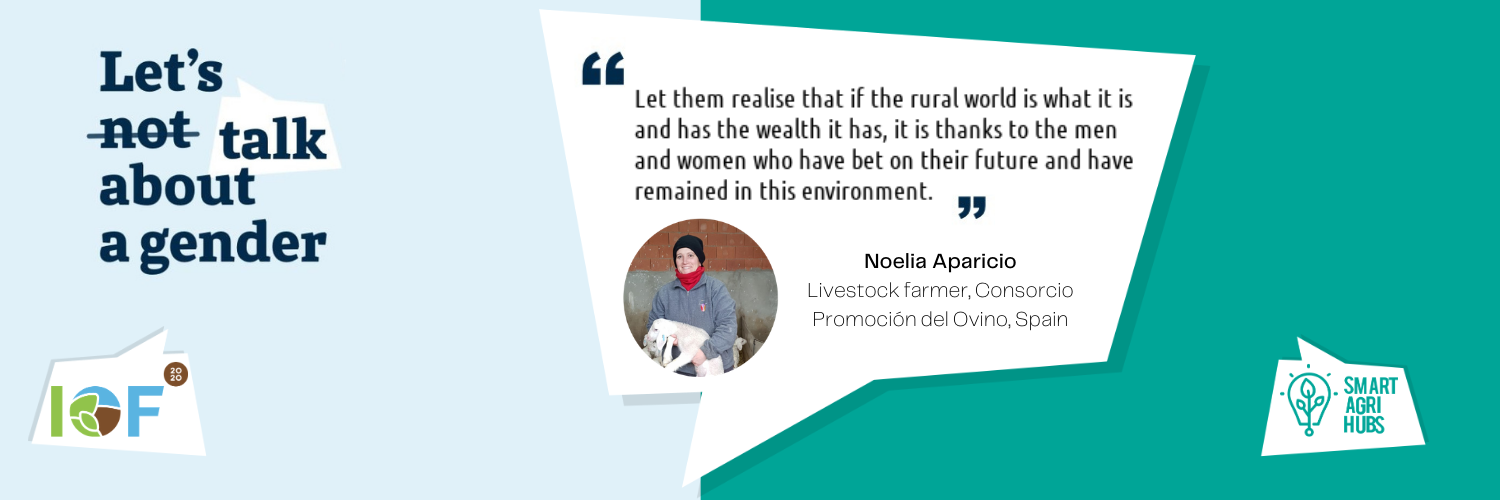Gender Equality Week - Noelia Aparicio

- WHO IS NOELIA APARICIO?
Can you elaborate a bit about your background? (city / countryside; formation, etc)
I was born and I live in a village, as I imagined since I was a child. I was not sure about what I was going to do, but I always thought that whatever I worked on, the ideal for me was to live in a village. My academic training is scarce, I only spent two years at university. From that moment on I have been training according to my hobbies and my needs, in order to run my family farm.
What was your experience at the university?
As I said before, my experience at university was very short. What marked me the most during my time at university was living in a flat. I remember that it was a big change for me to go from living in a big house with its own garden to living in a flat with small rooms. I studied Mathematical Sciences (exact name in 1990). The number of men outnumbered the number of women. I don't remember the statistics but I imagine it was 85% or 90% men versus 10% or 15% women. In this sense, it is worth noting that I have always moved in worlds where men predominate.
What advice would you give to any young person starting to build a career similar to yours today?
If by a career you mean the one I started but didn't finish, I don't think I'm the one to give advice. But I would dare to suggest that they should take advantage of and prepare for all the options and opportunities that come their way. If you are referring to my current work, as a livestock farmer on my family farm, I would tell you to prepare yourself mentally to have the capacity for effort, sacrifice, and perseverance. If you read this and you are already discouraged, think of any successful business or even any elite athlete. If you look into their history you will see that they all have this in common: effort, sacrifice, and perseverance.
Do you feel that your career would have been different if you were a man?
Not really, and I can explain: My family farm is created from scratch, my husband and I began by buying the farm, doing the project, building the shed, buying the herd, etc. But both my husband and I were present at all times to make the decisions. The process has been long and difficult but I think it has been just as hard for him as it has been for me.
ON THE COOPERATIVE
Why did you choose this cooperative organization?
When I first thought of the Consorcio Promoción del Ovino (CPO) as a cooperative of which I could be part, I became enthusiastic about their project. A cooperative formed by the merge of five others whose aim is to become a reference point in the sheep sector. Today the role played by the CPO on my farm is fundamental, as it gets the best possible price for the milk and other products we produce. In addition, the CPO is always aware of the partner's needs and trains them in the latest developments in this field.
Would you say that agriculture is really a man's world, or do you see more women in this industry as well?
My perception is that there are more and more women involved in agriculture, but there is still a silver lining to reach the same number as men. Regarding the number of women working in agricultural cooperatives, I think that many have also joined and some even hold important positions.
Can you mention some of the gender equality measures that your company has in place, which do you think is the best / most efficient?
The integration of women in the Sheep Promotion Consortium is total, women represent 45% of the cooperative's staff and all of them hold positions of essential responsibility in the relationship with the farmers. The cooperative does not distinguish between women and men and has implemented all the measures for effective equality since its constitution, from the processes of selection and recruitment of personnel, through training, professional promotion, working conditions, family reconciliation, and remuneration. The most efficient measure is undoubtedly continuous training and professional promotion, both for women and men.
What could they do as a next step? What should agricultural companies do better?
Men and women are advancing day by day in terms of equality, we are equal. The next step must be to improve our ability to communicate equality and make it effective in representing the sheep sector within institutions, cooperatives, and agricultural organizations.
YOUR MESSAGE
What would you say to your 10-year-old self?
At this point, it does not make sense to say anything to her, but I would say something that is suitable for any age. I would say that you should take advantage of any moment to enrich yourself with culture, both rural and urban, history, etc. Don't be afraid to ask questions and do whatever you can to satisfy your curiosity.
What would you like to say to the decision-makers?
I'd love to tell them that when it comes to putting a new normal in place they should put themselves in the shoes of the people it affects. Let them realize that if the rural world is what it is and has the wealth it has, it is thanks to the men and women who 3/3 have bet on their future and have remained in this environment. That we are the ones most interested in taking care of it and probably also the ones who know the most about how to do it.
 About the author:
About the author:
Noelia Aparicio is a livestock farmer, member of the Consorcio Promoción del Ovino, Spain